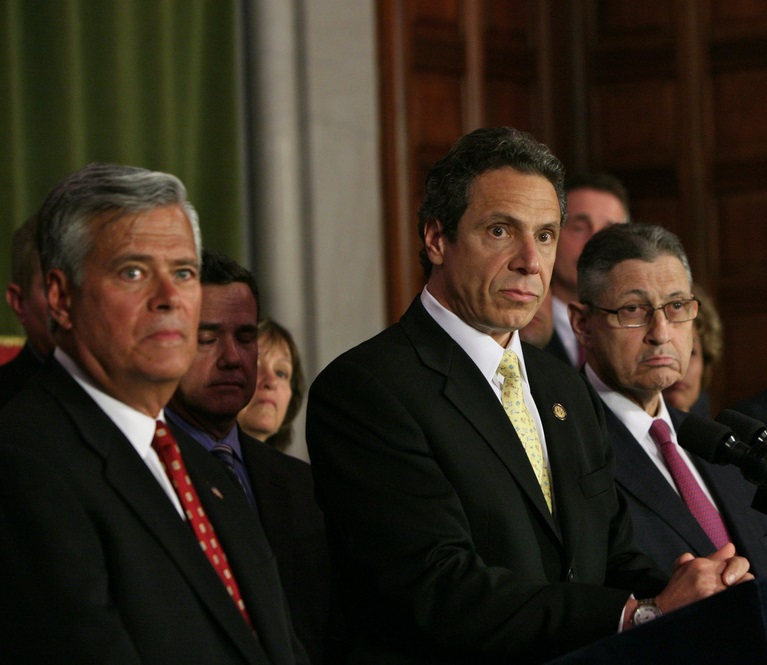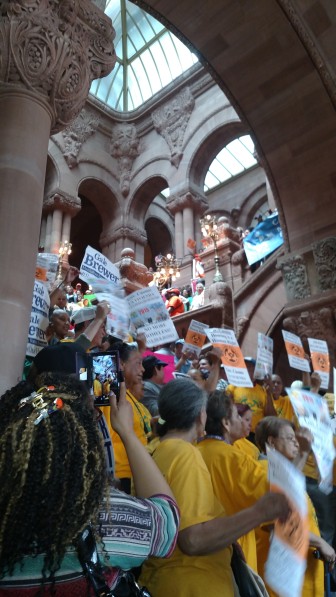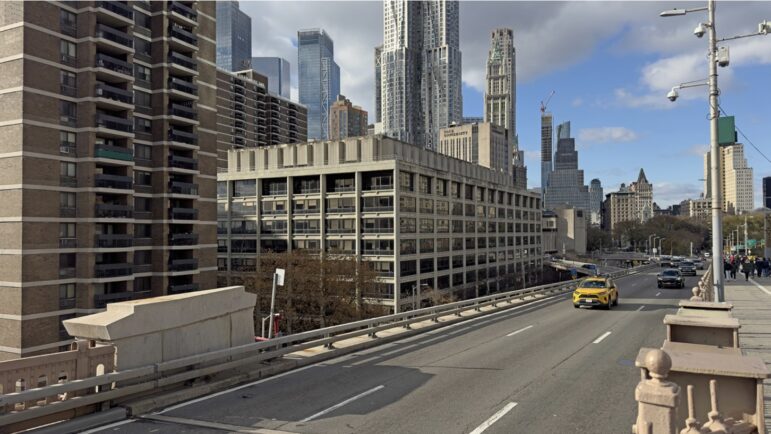
Office of the Governor
Gov. Cuomo seen in a 2011 photo with the two legislative leaders arrested on corruption charges this year, Dean Skelos at left and Sheldon Silver. Those arrests help set the stage for this week's last-minute drama.
The state’s rent regulations for 2.5 million tenants lapsed last night. And there’s sufficient blame to go around. By most accounts, renewal was never much in doubt this year. Until it was.
So how did we get here, and what kind of precedents have become important benchmarks along the way?
Some of the current saga can be traced back to the fight over the 2011 rent-regulation renewal. While there wasn’t much of a ‘battle” at the time, many were left wondering why tenant leaders—particularly in the Assembly—didn’t try for stronger laws. A New York Times story at the time said the deal fell “well short of what many Democrats and tenant activists had hoped for.” There were questions afterward about whether then-Speaker Sheldon Silver had accepted a deal that, while making modest improvements, could have been better for tenants.
The Moreland Commission on Public Corruption is created. When the special exemptions made for giant developers like Extell start to be exposed, a definitive anti-421a movement begins forming organically.
While campaigning for mayor, then-public advocate Bill de Blasio promises a rent freeze for regulated tenants after years of increases approved by the city’s Rent Guidelines Board (comprised exclusively of mayoral appointments) that tenant advocates argued ignored lagging renter incomes and padded landlord profits.
Gov. Cuomo abruptly shuts the Moreland Commission down in March. That move, and the questionable subsidies to the real estate industry, prompts US attorney Preet Bharara to begin his investigations into Albany lawmakers, as well as whether or not the governor behaved inappropriately by interfering with the Commission’s work.
In June, the Rent Guidelines Board, at the last moment before the final vote, a majority of members vote instead for a one percent increase on one year leases, 2.75 for two. De Blasio is reportedly furious, but some reports indicate that his deputy mayor engineered the bump as a reassuring overture to the real-estate industry.
In November elections, the Senate Republicans take full control of the state’s upper chamber, dashing the hopes of tenant advocates who’d hoped to have a Democratic majority as rent-regulations renewal loomed.
January 22: Silver, a Democrat from Manhattan, is arrested on corruption charges stemming from deals involving developers, including prolific campaign contributor Glenwood Management.
January 29: HPD Commissioner Vicky Been testifies in front of the New York City Council about 421-a, indicating the de Blasio administration supports its renewal before a June deadline and alluding to a need to reform the tax exemption, but providing few details.
April 1: The finalization of the state budget in April allows Albany lawmakers to begin looking at policy issues set to expire at the end of the legislative session in June including rent regulations and 421-a.

City Limits has been covering the rent regulations battle and the other key housing policy stories of 2015 all year. Click here to read our coverage.
May 4: Senate Leader Dean Skelos, a Long Island Republican, and his son are indicted for corruption. The charges involve dealings with Glenwood Management and 421-a tax breaks.
May 5: Mayor de Blasio begins discussing rent regulations, including repeal of vacancy decontrol—the first time he has publicly detailed his positions. Many consider the move to be too late in the process.
May 6: The de Blasio administration finally releases details about the modifications it seeks to 421-a, outlining a plan backed by the Real Estate Board of New York that strengthens affordability requirements but falls short of the reforms sought by critics.
May 17: Cuomo visits several churches pressing for an education tax credit that opponents believe violates the separation of church and state.
May 19: The Assembly passes its version of rent-regulation renewal.
May 31: Cuomo chides de Blasio for not including a prevailing wage requirement covering work performed on projects covered by 421-a. Unions begin to line up with the governor.
June 2: Assembly Housing committee chair, Keith Wright from Harlem, introduces his own 421a legislation that includes a prevailing wage requirement and measures to boost minority- and women-owned business enterprises.
June 6: Cuomo runs a Daily News editorial taking a strong pro-tenant position, calling for the end of vacancy decontrol and reforming the capital improvement system. He even pledges to hold a special session until the laws get renewed. Cuomo had previously backed a modest change to vacancy decontrol—moving the threshold from $2,500 to $2,700.
June 7: De Blasio calls for the end of 421-a if it can’t be modified.
June 10: Cuomo begins advocating a straight extension of 421-a in its current form, saying de Blasio’s “complex” 421-a proposal came too late in the process. Also, news reports say legislators are scared of Bharara’s scrutiny, so they are avoiding 421-a changes.
June 11: The state AFL-CIO backs a prevailing wage for 421-a.
June 12: Cuomo moves to a compromise on rent protections, far from the decisive stand he took in his editorial six days early. He returns to advocating a modest raising of the deregulation threshold, no change in the vacancy bonus or the policies on preferential rents and no mention of vacancy decontrol. Various compromise versions are rumored to be floating around for both 421-a and the rent laws.
June 14: New Assembly leader Carl Heastie and Cuomo blame Senate Republicans if the rent laws are allowed to lapse. Various rallies and pickets are scheduled for D-day. There is talk of a temporary extension of the rent laws until a new one can be hammered out, which would theoretically be retroactive. Cuomo sends an open letter to landlords warning them not to take advantage of a temporary lapse in rent laws.
June 15: New York State rent regulations expire with two days left in the legislative session.
City Limits coverage of public housing and New York’s rental affordability crisis is supported by the Charles H. Revson Foundation.








One thought on “Timeline of Failure: How NYS Got to a Rent Laws’ Lapse”
Pingback: Board Of Elections New York State Campaign Finance | Your Stock Market Place